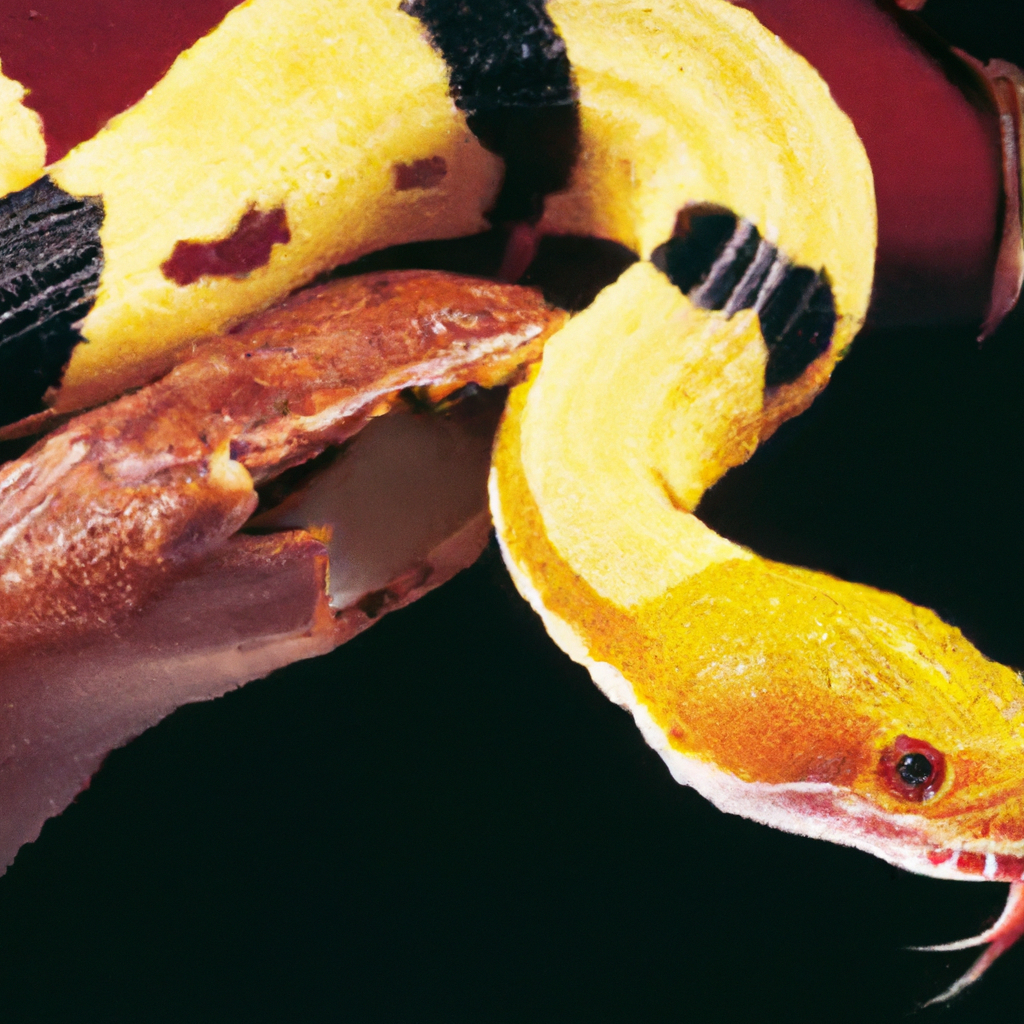Are you a reptile owner looking for the best source of protein for your scaly friend? Look no further! In this article, we will discuss the importance of proteins for reptiles and the best protein sources you can provide for their optimal health and growth. Whether you own a snake, turtle, or lizard, understanding their dietary requirements is essential to ensure their well-being. So, let’s dive into the fascinating world of reptile nutrition and explore the various protein options available to keep your reptilian companion happy and healthy.
Proteins for Reptiles
When it comes to maintaining a healthy diet for your reptile, proteins play a crucial role. They act as the building blocks for tissue growth and repair, provide energy, assist in biochemical reactions, contribute to hormone production and regulation, and support a properly functioning immune system. In this article, we will explore the importance of proteins in a reptile’s diet, discuss the different types of proteins available, examine their quality and bioavailability, and delve into the protein requirements of different reptile species. Additionally, we will highlight protein-rich foods for reptiles and address any potential risks and precautions associated with protein intake.
Importance of Proteins in Reptile Diet
Building Blocks for Tissue Growth and Repair
Just like humans, reptiles require proteins as the foundation for tissue growth and repair. Proteins are made up of amino acids, which are essential for the development and maintenance of muscles, organs, skin, and other vital tissues in reptiles. Without an adequate supply of proteins, reptiles may experience stunted growth, slow healing of injuries, and various health issues.
Energy Source for Reptiles
Proteins serve as an important source of energy for reptiles. While carbohydrates and fats can also provide energy, proteins are broken down into amino acids, which can be converted into glucose through a process called gluconeogenesis. This glucose is then utilized as fuel by the reptile’s body, especially during periods of increased physical activity or stress.
Enzyme Formation and Biochemical Reactions
Enzymes are essential for the proper functioning of biochemical reactions in a reptile’s body. Proteins are responsible for the formation of enzymes, which act as catalysts in these reactions. Enzymes play a vital role in digestion, metabolism, and various other physiological processes. Without the necessary proteins, reptiles may struggle to produce the enzymes required for these reactions, resulting in impaired bodily functions.
Role in Hormone Production and Regulation
Proteins are involved in the production and regulation of hormones in reptiles. Hormones are chemical messengers that help coordinate various bodily functions and processes. They affect behaviors, growth, reproduction, and overall health. Proteins play a crucial role in the synthesis of hormones, ensuring that the reptile’s endocrine system functions optimally.
Immune System Function
Proteins are fundamental to a reptile’s immune system. They are involved in the production of antibodies, which help fight against infections and diseases. Additionally, proteins contribute to the functioning of cells and tissues responsible for immune responses. An insufficient intake of proteins can compromise a reptile’s immune system, leading to increased susceptibility to illnesses and a weakened defense against pathogens.

Different Types of Proteins for Reptiles
When it comes to protein sources for reptiles, there are several options to consider. Each type of protein offers unique benefits and considerations, depending on the specific dietary needs of your reptile.
Animal-Based Proteins
Animal-based proteins are derived from various animal sources and are often considered the most natural and readily available form of protein for reptiles. They closely resemble the diet of wild reptiles and are typically high in essential amino acids.
Insect-Based Proteins
insect-based proteins have gained popularity in recent years as a nutritious and environmentally friendly option for reptiles. Insects such as crickets, mealworms, and silkworms offer a balanced combination of proteins, fats, and other nutrients, making them an excellent choice for insectivorous reptiles.
Fish-Based Proteins
Fish-based proteins can be a valuable addition to a reptile’s diet, especially for aquatic reptiles. Fish, such as minnows or anchovies, provide essential omega-3 fatty acids and high-quality proteins. However, caution must be exercised when feeding fish to reptiles due to potential risks associated with mercury and thiaminase content.
Plant-Based Proteins
Plant-based proteins can be an important component of a reptile’s diet, particularly for herbivorous and omnivorous species. Vegetables, greens, legumes, beans, nuts, and seeds offer a range of essential amino acids, vitamins, and minerals. Incorporating these protein-rich plant sources can help diversify the reptile’s diet and ensure a well-rounded nutritional profile.
Animal-Based Proteins
Animal-based proteins are derived from various animal sources and have been a staple in reptile diets for many years. These proteins closely resemble the diet of wild reptiles, as they often consume live prey or carrion. It is essential to consider the benefits and considerations of animal-based proteins when choosing to include them in a reptile’s diet.
Meat and Poultry
Meat and poultry, such as chicken, turkey, or beef, are common sources of animal-based proteins for reptiles. They provide essential amino acids and can be offered in frozen or thawed forms. However, it is crucial to ensure that the meat is free from seasoning, additives, or preservatives, as these can be harmful to reptiles.
Eggs and Dairy Products
Eggs and dairy products, such as scrambled eggs or plain yogurt, can be excellent sources of animal-based proteins for reptiles. Eggs are a complete protein, containing all the essential amino acids reptiles need. Dairy products offer additional sources of protein and calcium. However, caution should be exercised as some reptiles may be lactose intolerant, and excessive consumption of dairy can lead to digestive issues.
Benefits and Considerations
Animal-based proteins offer a range of benefits for reptiles. They are typically high in essential amino acids, which are crucial for proper growth, development, and overall health. They closely resemble a reptile’s natural diet, making them more readily digestible. However, it is important to consider the source and quality of animal-based proteins, ensuring they are free from harmful additives or contaminants.

Insect-Based Proteins
Insect-based proteins have gained popularity in recent years as a nutritious and sustainable alternative for reptiles. Insects offer a well-balanced combination of proteins, fats, and other nutrients, making them an excellent choice for insectivorous reptiles.
Crickets
Crickets are widely recognized as an excellent source of insect-based proteins for reptiles. They are readily available and easy to breed, making them a convenient option for reptile enthusiasts. Crickets provide a good balance of protein, calcium, and other essential nutrients required for reptile health.
Mealworms
Mealworms are another popular insect-based protein option for reptiles. They are commonly fed to reptiles such as bearded dragons and leopard geckos. Mealworms are high in protein and fat, making them a nutritious choice. However, their exoskeleton is relatively high in chitin, which can be more challenging for reptiles to digest.
Silkworms
Silkworms are a nutrient-dense option for reptiles. They have a soft body and are highly palatable to many reptile species. Silkworms contain higher levels of protein and lower levels of fat compared to other insects. Reptiles, such as chameleons and water dragons, often enjoy silkworms as part of their diet.
Benefits and Considerations
Insect-based proteins offer numerous benefits for reptiles. They are natural prey items for many reptile species, ensuring a more instinctual feeding experience. Insects provide essential nutrients, such as amino acids, vitamins, and minerals, that are necessary for reptile growth and overall well-being. However, it is essential to consider the size and variety of insects offered, as well as their gut-loading and supplementation with calcium and other nutrients, to ensure a balanced diet.
Fish-Based Proteins
Fish-based proteins can be a valuable addition to a reptile’s diet, particularly for aquatic reptiles. Fish offer essential omega-3 fatty acids and high-quality proteins. However, caution must be exercised when feeding fish to reptiles due to potential risks associated with mercury and thiaminase content.
Benefits of Fish in Reptile Diet
Fish, such as minnows or anchovies, provide several benefits when incorporated into a reptile’s diet. They are an excellent source of high-quality proteins that provide essential amino acids for reptile growth and development. Fish also contain omega-3 fatty acids, which have anti-inflammatory properties and contribute to overall reptile health.
Feeding Fish to Aquatic Reptiles
Aquatic reptiles, such as turtles or some species of snakes, can benefit from fish-based proteins. These reptiles often naturally consume fish in the wild, making it a more suitable dietary addition. The fish can be offered whole or as fillets, and it is essential to consider the appropriate size and frequency of fish feeding based on the reptile’s size and nutritional needs.
Precautions and Considerations
While fish-based proteins can be beneficial, special precautions must be taken. Some fish species, particularly large predatory fish, may contain elevated levels of mercury, which can be harmful to reptiles. It is important to select smaller fish species with lower mercury content and avoid excessive or exclusive fish feeding. Additionally, certain fish species contain thiaminase, an enzyme that can break down thiamine (vitamin B1) and cause a nutrient deficiency in reptiles. It is crucial to ensure a varied diet and consider nutritional supplementation to mitigate any potential risks associated with fish-based proteins.

Plant-Based Proteins
Although reptiles are generally known for their carnivorous or insectivorous diets, some reptile species require or benefit from plant-based proteins. Plant-based proteins can provide a range of essential amino acids, vitamins, and minerals necessary for reptile health.
Vegetables and Greens
Vegetables and greens can be an excellent source of plant-based proteins for reptiles. Dark leafy greens such as collard greens, kale, or dandelion greens provide essential vitamins and minerals while offering some protein content. Additionally, vegetables like squash, carrots, or bell peppers can provide additional nutrients and fiber.
Legumes and Beans
Legumes and beans, such as lentils, chickpeas, or black beans, offer a rich source of plant-based proteins. These protein-rich options can be cooked, mashed, or offered in sprouted forms for reptiles. They provide essential amino acids and contribute to a well-rounded diet for herbivorous or omnivorous reptile species.
Nuts and Seeds
Nuts and seeds can be incorporated into a reptile’s diet as a source of plant-based proteins and healthy fats. Options like almonds, pumpkin seeds, or chia seeds offer nutritional value and can be provided in small quantities as a treat or part of a balanced diet. However, caution should be exercised as some nuts and seeds may be high in fats and calories.
Benefits and Considerations
Plant-based proteins offer several benefits for reptiles, especially for herbivorous or omnivorous species. They provide a wide range of essential amino acids, vitamins, and minerals necessary for reptile growth, energy, and overall health. Incorporating vegetables, greens, legumes, nuts, and seeds into their diet can help diversify the reptile’s nutritional intake and provide important dietary variety. However, it is crucial to ensure that plant-based proteins are balanced with other essential nutrients to meet the specific dietary requirements of the reptile species.
Protein Quality and Bioavailability for Reptiles
When considering protein sources for reptiles, it is important to take into account their quality and bioavailability. These factors determine the nutritional value and utilization of proteins by reptiles.
Complete Proteins vs. Incomplete Proteins
Proteins are composed of various amino acids, which can be classified as essential or non-essential. Essential amino acids cannot be synthesized by reptiles and must be obtained through their diet. Complete proteins contain all essential amino acids in the correct proportions necessary for reptile health, while incomplete proteins lack one or more essential amino acids. It is crucial to provide a varied diet that includes a combination of complete and incomplete proteins to ensure a balanced amino acid profile.
Digestibility and Absorption
The digestibility and absorption of proteins are important aspects to consider when evaluating their quality for reptiles. Proteins that are easily digestible and absorbed by the reptile’s digestive system allow for efficient utilization of essential amino acids and other nutrients. The digestibility of proteins can vary depending on their source, processing method, and overall quality.
Essential Amino Acids for Reptiles
Reptiles have specific essential amino acid requirements to support their growth, tissue repair, and overall health. The specific amino acid composition may vary depending on the reptile species, making it important to consider the nutritional needs of each reptile individually. Providing a diverse range of protein sources can help ensure that a reptile receives all the necessary essential amino acids for optimal health.
Balancing Protein Sources in the Diet
To provide a balanced diet for reptiles, it is important to consider the quality and variety of protein sources. A combination of animal-based proteins, insect-based proteins, fish-based proteins, and plant-based proteins can help fulfill the specific nutritional requirements of each reptile species. By offering a diverse array of protein sources, reptile owners can help ensure that their reptiles receive all the essential amino acids and nutrients needed for their well-being.

Protein Requirements for Different Reptile Species
The protein requirements of reptiles can vary depending on their species, life stage, and activity level. Understanding the specific protein needs of your reptile is crucial for maintaining their health and well-being.
Carnivorous Reptiles
Carnivorous reptiles, such as snakes or monitor lizards, require a diet primarily composed of animal-based proteins. Their protein requirements are relatively high compared to other reptile species due to their specialized dietary needs. It is important to provide high-quality animal-based proteins, such as whole prey items or appropriately formulated commercial diets, to meet the protein requirements of carnivorous reptiles.
Omnivorous Reptiles
Omnivorous reptiles, such as bearded dragons or box turtles, have a more varied diet that includes both animal-based and plant-based proteins. Their protein requirements can be met by offering a combination of insects, lean meats, leafy greens, and other plant-based protein sources. It is important to provide a balanced and diverse diet to ensure that omnivorous reptiles receive all the necessary nutrients, including proteins.
Herbivorous Reptiles
Herbivorous reptiles, including tortoises and iguanas, have specialized dietary needs focused on plant-based proteins. Their protein requirements can be met by offering a variety of vegetables, greens, legumes, and plant-based protein sources. It is crucial to ensure that herbivorous reptiles receive adequate protein intake while also meeting their specific dietary needs for fiber, vitamins, and minerals.
Potential Risks and Precautions
While proteins are essential for reptile health, there are some potential risks and precautions associated with protein intake that reptile owners should be aware of.
Protein Overload and Health Issues
Providing excessive amounts of protein in a reptile’s diet can lead to health issues. High-protein diets can strain the liver and kidneys, as these organs are responsible for processing and eliminating excess protein byproducts. This can result in liver or kidney damage, leading to long-term health complications. It is important to ensure that protein intake is appropriate for the specific reptile species and to consult with a reptile veterinarian for guidance.
Caution with Insect-Based Proteins
While insect-based proteins can be highly beneficial for reptiles, caution should be exercised when selecting and sourcing insects. Insects that are caught in the wild may carry parasites or be exposed to pesticides, which can be harmful to reptiles. It is advisable to purchase insects from reputable sources that raise insects specifically for reptile consumption. Additionally, gut-loading insects with nutrient-rich foods and providing appropriate calcium supplementation is crucial in optimizing their nutritional value.
Allergies and Sensitivities
Reptiles, like humans, can develop allergies or sensitivities to certain proteins or protein sources. If a reptile exhibits signs of an allergic reaction, such as excessive itching, swelling, or respiratory distress, it is important to identify and eliminate the allergenic protein source from their diet. Consulting with a reptile veterinarian can help diagnose and manage protein-related allergies or sensitivities in reptiles.
Consulting a Reptile Veterinarian
To ensure that your reptile receives the appropriate amount and quality of proteins, it is strongly advised to consult with a reptile veterinarian. They can provide guidance on the specific dietary requirements of your reptile species, recommend suitable protein sources, and address any health concerns or risks associated with protein intake.
In conclusion, proteins are a vital component of a reptile’s diet, serving as building blocks for tissue growth and repair, an energy source, enzymes for biochemical reactions, hormones for regulation, and support for immune system function. Reptiles can derive proteins from animal-based, insect-based, fish-based, and plant-based sources. It is crucial to provide a balanced and diverse diet that fulfills the protein requirements of each reptile species. By understanding the importance of proteins, the different types available, their quality and bioavailability, and the specific protein requirements of reptiles, you can ensure that your scaly friend receives a nutritionally balanced diet for optimal health and well-being.

